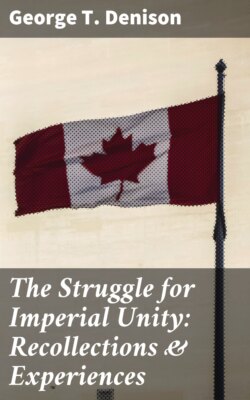Читать книгу The Struggle for Imperial Unity: Recollections & Experiences - George T. Denison - Страница 19
На сайте Литреса книга снята с продажи.
Оглавление(1) British Connection, Consolidation of the Empire, and in the meantime a voice in treaties affecting Canada.
(2) Closer trade relations with the British West India Islands, with a view to ultimate political connection.
(3) Income Franchise.
(4) The Ballot, with the addition of compulsory voting.
(5) A Scheme for the Representation of Minorities.
(6) Encouragement of Immigration, and Free Homesteads in the Public Domain.
(7) The imposition of duties for Revenue, so adjusted as to afford every possible encouragement to Native Industry.
(8) An improved Militia System, under the command of trained Dominion Officers.
(9) No Property Qualifications in Members of the House of Commons.
(10) The Reorganisation of the Senate.
(11) Pure and Economic Administration of Public Affairs.
It will be noticed that the very first plank in the platform was “British Connection, Consolidation of the Empire, and in the meantime a voice in treaties affecting Canada.” This certainly was not favouring either Independence or Annexation, and of the other ten items nearly every point has since been carried into practice.
At the first public meeting, held on 6th December, 1873, Mr. W. H. Howland was in the chair. He knew very little of our objects or aspirations. He was the son of Sir Wm. P. Howland, who had been a citizen of the United States, and had only settled in Canada some fourteen years before W. H. Howland was born. Sir Wm. Howland was a most useful and patriotic citizen, and during a very long life did great service to Canada in various capacities, but neither he nor his son had the inherited traditions of loyalty to the Empire which animated the older Canadians, and the result was that at this first meeting the chairman’s remarks struck a discordant note in the minds of the majority of the members of the National Association. “He held that there was too much toadyism to English aristocratic usages in this country. There was too much toadyism to titles. We would have no aristocracy in this country but the aristocracy of merit, no order but the order of merit, and the sooner the English Government recognised the fact that the adornment of a man in this country with the feelings they entertained was rather an insult than an honour to our people, the sooner would they appreciate our real sentiment. Many Canadians who had gone home had, he held, brought us into contempt by their toadying.”
The result of this speech was most unfortunate. I believe he did not speak for more than fifteen or twenty minutes, but in that time he had practically killed the movement as a political organisation. The committee were dissatisfied and disheartened; the political Press seized at once on the weak points, and attacked the organisation for advocating Independence, and charged it with being disloyal in its objects. Mr. Goldwin Smith then joined it and hoped to use it for the purpose of advocating the disruption of the tie which bound Canada to the Empire. The National Club was founded by this organisation at this time.
I returned to Canada shortly after the movement had been launched and was at once appealed to by my old comrades to join and help to redeem the party from the taint of Independence which it had acquired through the unfortunate speech of W. H. Howland in introducing it to public notice. I declined positively, telling them that it was too late, and it would have to die a natural death. As a political party it lost strength and soon died, its demise being hastened by the fact that it gave encouragement to a few young men to come out openly in favour of Canadian Independence, supported as they were by the great social and literary status of Mr. Goldwin Smith, who has always been willing to assist any movement likely to injure the unity of the British Empire.
